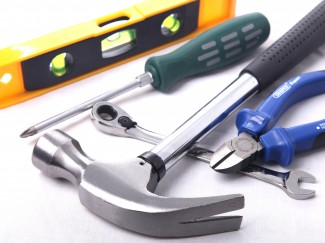How to Create An Emergency Anxiety Toolkit

Years ago, a good friend of mine who also struggles with anxiety told me a story about how she sees her disorder. She said she visualizes her anxiety as the Incredible Hulk -- a 1000-pound green monster that, when it comes out, threatens to flatten her entire landscape. She said it can't be bargained with, and it can't be reasoned with. "But," she said, "it can be contained. I can keep it in check, and eventually put it back in its cage, but I have to be ready. That's why I always keep my emergency anxiety toolkit handy."
"What's an anxiety toolkit?" I said. I was young, and none too bright about managing -- or even recognizing -- my own anxiety in those days.
She said:
It's a bunch of skills I can use in a heartbeat when things really get out of control. I have to keep a long, written list ready, because when my anxiety's really bad, I can't remember what to do to help myself. It's like my mind just goes blank. Oh Greg, you just don't know how powerful anxiety can be!
I may not have understood what she was talking about then, but I sure do now. I know exactly how powerful anxiety can be. That's why I have my own emergency anxiety toolkit.
Creating Your Emergency Anxiety Toolkit
If you struggle with anxiety disorder, I would encourage you to create an emergency anxiety toolkit, too. Like my friend said, it's a go-to set of skills you can use when the Incredible Hulk is really working you over. Yours may be different than mine, which is totally okay. The point is to find easy-to-use anxiety management skills you can turn to in a pinch.
Below are some suggestions for how to create an emergency anxiety toolkit. These are the things I've learned that work from long, and generally bitter, experience. Hopefully, they can help you too:
- Exercise -- Anxiety isn't just a mental/emotional experience. It's also a physiological state wherein the systems of the body go on high alert, the old "fight or flight" response. Changing the state of your body during bad anxiety attacks can help reduce the pain. I lift weights when I'm in a bad way, but even non-strenuous exercise like taking a 20 minute walk can do wonders for your mood. Try it the next time you're really freaking out. You'll be surprised how much it helps.
- Meditation -- Meditation also changes your physical state by changing your brain chemistry, but forget about finding your eternal bliss in the midst of an anxiety attack. I'm talking about trench warfare meditation that's stone simple and can literally be done in a couple of minutes (Increase Focus with a One Minute Meditation).
- Make a list -- A lot of my anxiety consists of worrying about all the stuff I need to get done, then feeling so overwhelmed that I end up doing nothing. That horrible paralysis can be broken, however, by making lists of the required tasks. Learning how to get things done when you're anxious is an important tool for your emergency anxiety toolkit.
- Focus on one thing at a time -- This is also known as "do what's right in front of you." You can't do anything about the past because it's over. You also can't do anything about the future because it hasn't happened yet. The only thing you change is what you're doing today, right now. Focus on what's right in front of you and stick to your plan for today as best you can.
- Distract yourself -- Sometimes, the best way to deal with anxiety is to deliberately not deal with it, to distract yourself from it. Being able to escape is an important tool in my emergency anxiety toolkit, as long as escaping is not my only tool. Binge watching Netflix is one of my favorite ways to get away from it all for awhile.
- Get support -- The pain of living with anxiety disorder symptoms can't really be understood unless you've experienced it yourself. That's why it's important for us anxious types to get support from other people who've been there. Therapy, friends, and online support like the HealthyPlace forums are all good options for getting help.
There's no doubt the Incredible Hulk of anxiety can be scary. It's big, it's mean, and it can be damned ugly, too. But it can be tamed with the right set of tools. That's why it's so important to create an emergency anxiety toolkit that's easy to use when the beast of anxiety gets out of its cage.
You can find Greg on his website, Twitter, Google+, Pinterest, and Facebook.
APA Reference
Weber, G.
(2015, February 4). How to Create An Emergency Anxiety Toolkit, HealthyPlace. Retrieved
on 2026, January 17 from https://www.healthyplace.com/blogs/treatinganxiety/2015/02/how-to-create-an-emergency-anxiety-toolkit
Author: Greg Weber
This was such a wonderful article! Very well stated!
